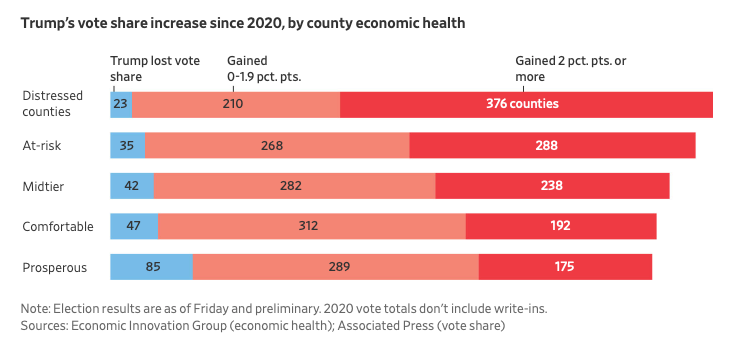November 12 2024
GOP controls Congress; Trump administration roles; Trump gains with wealthy; Oil demand down; Sickest patients switch from Medicare Advantage to Medicare; Property tax revolt; Rubio on China; Internet bday

FLASH …REPUBLICANS OFFICIALLY CONTROL HOUSE…SECURE PRESIDENCY, SENATE, AND HOUSE AFTER ELECTION…
Trump Administration roles
1. Trump Expands Support in Affluent Areas, Winning Broad Voter Base for White House Return
2. OPEC Cuts Global Oil Demand Growth Forecasts For a Fourth Consecutive Month
3. Medicare Advantage’s Sickest Patients Turn to Traditional Medicare
4. Property Tax Relief Measures Pass Across Multiple U.S. States
5. Rubio: “Communist China is the most powerful adversary the United States has faced”
November 12, 1990: Sir Timothy John “Tim” Berners-Lee, a British computer scientist, publishes a formal proposal for the creation of the World Wide Web.
See the new Ad Astra Podcast! Released on Apple and Spotify around 10a CST.
FLASH …REPUBLICANS OFFICIALLY CONTROL HOUSE…SECURE PRESIDENCY, SENATE, AND HOUSE AFTER ELECTION…
Trump Administration roles
Marco Rubio reported to be offered Secretary of State
Mike Waltz reported to be offered National Security Adviser
Kristi Noem reported to be offered Secretary of Homeland Security
Lee Zeldin offered Environmental Protection Agency
Ohio Gov. Mike DeWine is reportedly considering appointing Vivek Ramaswamy to replace JD Vance in the Senate
1. Trump Expands Support in Affluent Areas, Winning Broad Voter Base for White House Return
Donald Trump retook the White House with a big boost from economically distressed communities—places full of workers he has called “the forgotten men and women who have been neglected.” More surprising: He also ran up gains in many places where workers and businesses are thriving. Compared with his 2020 loss, he improved his vote share in more-affluent coastal enclaves and suburban areas, as well as in lower-income border counties and rural areas that have long backed the GOP. His advance presents a major challenge to Democrats, who have increasingly relied on the nation’s professional-class voters to counteract collapsing support in small-town and rural America. On Tuesday, that calculation failed.

Article Source: WSJ
2. OPEC Cuts Global Oil Demand Growth Forecasts For a Fourth Consecutive Month
OPEC cut its oil demand growth forecasts for this year and next for a fourth consecutive month as it belatedly recognized a slowdown in top consumer China. Global oil consumption will increase by 1.8 million barrels a day — just under 2% — in 2024, the Organization of Petroleum Exporting Countries in a monthly report. That’s 107,000 barrels a day less than previously forecast after data from across Asian nations like China and India, as well Africa, arrived below expectations, it said. OPEC has scaled back this year’s demand growth projections by almost a fifth since July, in keeping with a sharp retreat in crude prices.
Editors note: This is not about cutting emissions. This is due to economic slowdown, mainly in China.
Article Source: Bloomberg
3. Medicare Advantage’s Sickest Patients Turn to Traditional Medicare
A Wall Street Journal analysis of Medicare data found a pattern of Medicare Advantage’s sickest patients dropping their privately run coverage just as their health needs soared. Many, like Greene, made the switch after running into problems getting their care covered. Plans run by the private insurers in the Medicare Advantage system are supposed to offer old and disabled people the same benefits they would get from traditional Medicare. The plans can be a bargain for people because they limit out-of-pocket expenses and often offer extra benefits such as dental care. As recipients get sicker, though, they may have more difficulty accessing services than people with traditional Medicare. That’s because the insurers actively manage the care, including requiring patients to get approval for certain services and limiting which hospitals and doctors patients can use. People in the final year of their lives left Medicare Advantage for traditional Medicare at double the rate of other enrollees from 2016 to 2022, the Journal’s analysis found. Those private-plan dropouts—300,075 during that time span—often had long hospital and nursing-home stays after they left, running up large bills that taxpayers, not their former insurers, had to pay.
Article Source: WSJ
4. Property Tax Relief Measures Pass Across Multiple U.S. States
Voters in eight U.S. states this week passed measures to offer some form of relief on property tax, a sign of their mounting frustration with tax bills that have soared alongside big increases in home values. Georgia approved a constitutional amendment that caps assessments for all current homeowners, while Florida passed an initiative that pegs the value of one type of property tax exemption to annual inflation. In Wyoming, voters passed a constitutional amendment that allows residences to be assessed separately from other types of real estate. This could lead lawmakers to pass lower tax rates for homeowners in the future. Two of 10 state proposals to curb property tax failed on Tuesday, including one in North Dakota that was the most far-reaching and would have eliminated all property taxes. It lost with less than 37% of the vote after facing stiff opposition from a variety of interest groups as well as from Doug Burgum, the state’s Republican governor. Still, the property tax revolt is well under way and might get bigger soon, as people continue to receive higher tax assessments that capture the sharp rise in property values nationwide over the past few years. “Voters across the country are upset with rising property tax burdens and they have made that known to lawmakers,” said Jared Walczak, vice president of state projects at the Tax Foundation, a conservative-leaning think tank. Other prices related to homeownership—especially home insurance—keep rising and show little sign of abating. New limitations on property tax threaten to create revenue issues for some municipalities. Local governments levied $363.3 billion in property taxes on single-family homes in 2023, according to an analysis of 89.4 million homes by property data firm Attom. That was a 6.9% increase from 2022 and the largest increase in the last five years, Attom said. The rise in anti-property tax sentiment is reminiscent of the 1970s and early ’80s, when homeowners protested rising inflation at the ballot box in states including California and Massachusetts.
Article Source: WSJ
5. Rubio: “Communist China is the most powerful adversary the United States has faced”
Communist China is the most powerful adversary the United States has faced in living memory. This is no exaggeration. We sometimes forget that past enemies, including Nazi Germany and Soviet Russia, had smaller economies than we did. Each tried to take over its neighbors and hurt our country in the process. Each failed because America out- built and outgunned it. However, the Chinese Communist Party is playing a better hand, as it controls the largest industrial base in the world, fuels its factories with market-distorting subsidies and rampant theft, and, as this report highlights, now leads in many of the industries that will determine geopolitical supremacy in the 21st century, from shipbuilding to electric vehicles. This means Beijing will have greater sway over which set of values defines the 21st century: liberty and representative government, or authoritarianism and oppression. To make matters worse, the United States is in a weaker position than it was in the past. Decades of overregulation and “free trade” with adversarial economies like China’s have eroded our industrial base. Shuttered factories, drugs, and illegal immigration have destroyed small-town communities. Four years of the Biden-Harris Administration appeasing our adversaries abroad, raising the cost of living at home, and undermining our economy with red tape, endless reviews, and woke diversity mandates haven’t helped.
Article Source: Marco Rubio
November 12, 1990: Sir Timothy John “Tim” Berners-Lee, a British computer scientist, publishes a formal proposal for the creation of the World Wide Web.
Sources
3. https://www.wsj.com/politics/elections/trump-made-big-gains-in-wealthier-places-too-we-crunched-the-numbers-3c5639c2
4. https://www.bloomberg.com/news/articles/2024-11-12/opec-cuts-global-oil-demand-growth-forecasts-for-a-fourth-consecutive-month
5. https://www.wsj.com/health/healthcare/medicare-private-plans-insurers-389af1a0?st=LCbxXJ&reflink=article_copyURL_share
6. https://www.wsj.com/real-estate/property-taxes-ballot-measures-election-1ea01b1b
7. https://www.rubio.senate.gov/wp-content/uploads/2024/09/The-World-China-Made.pdf
